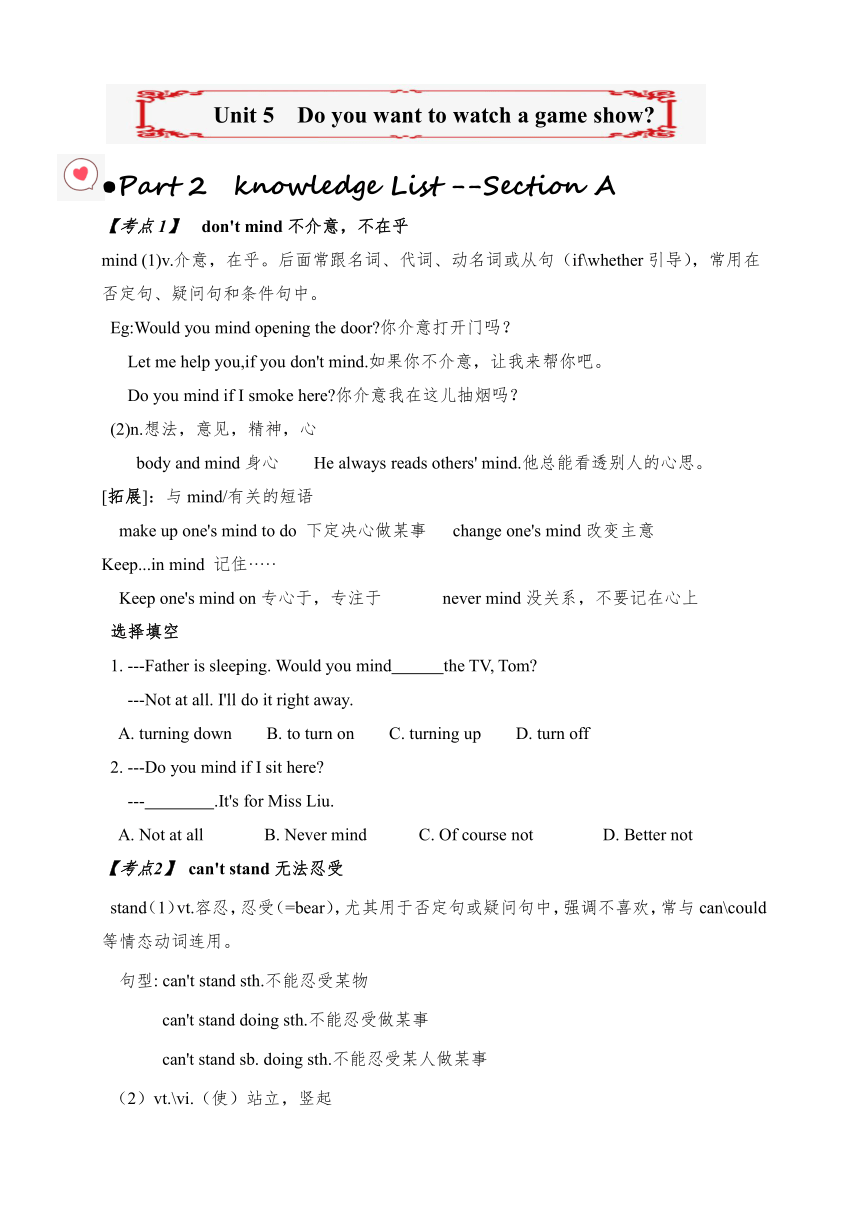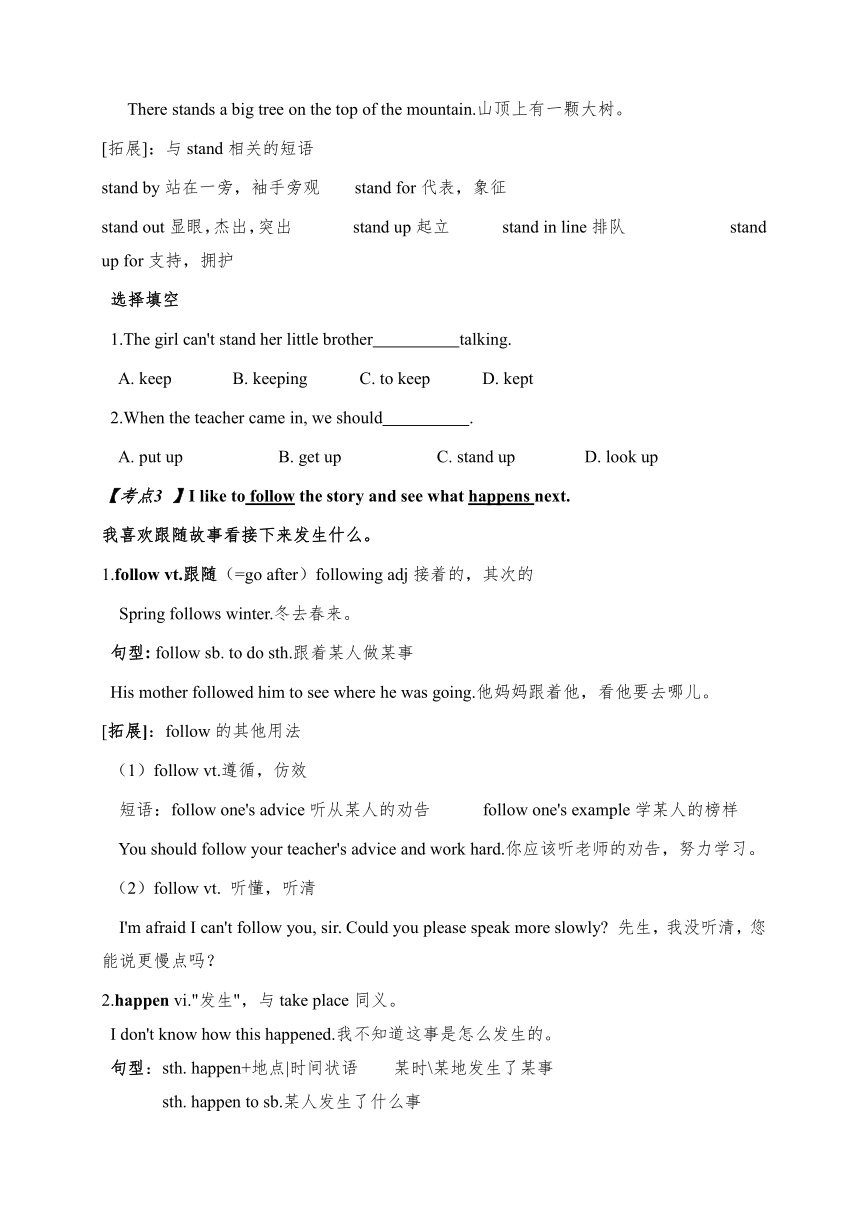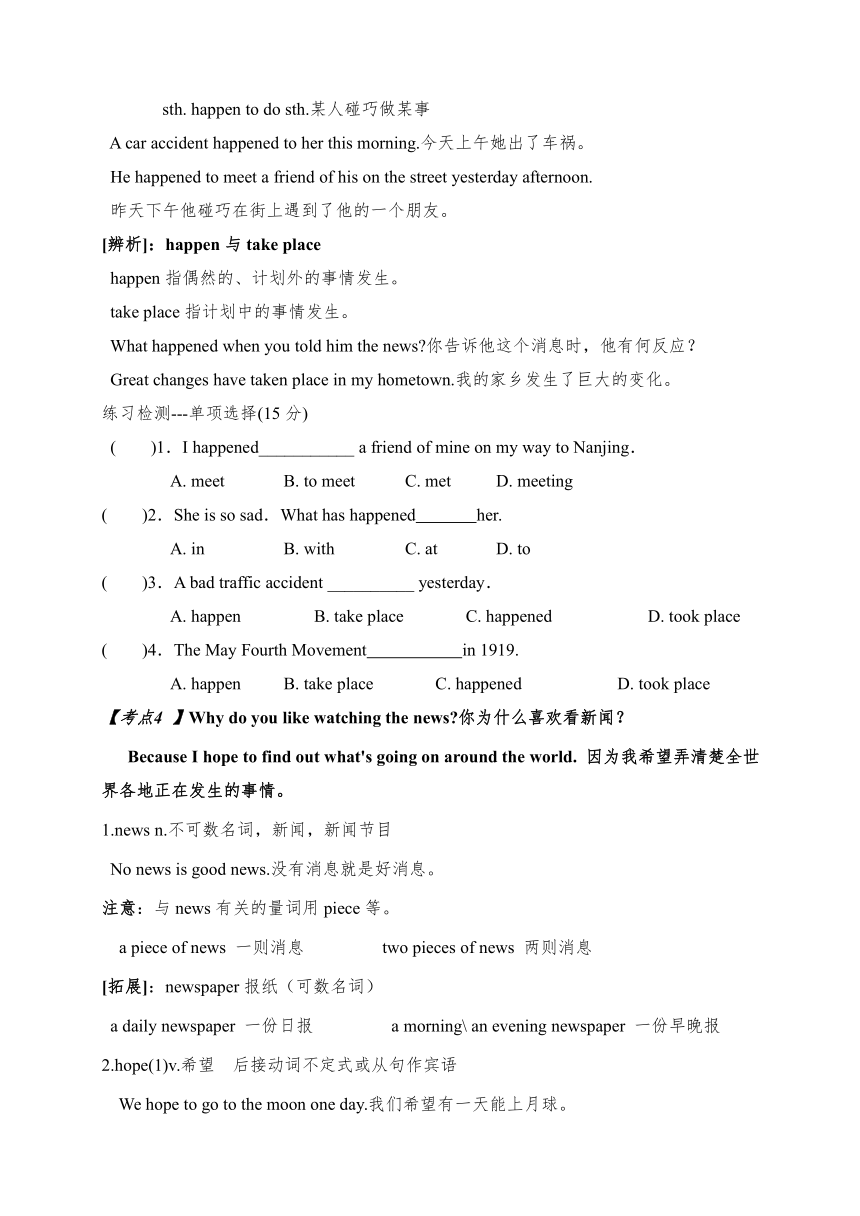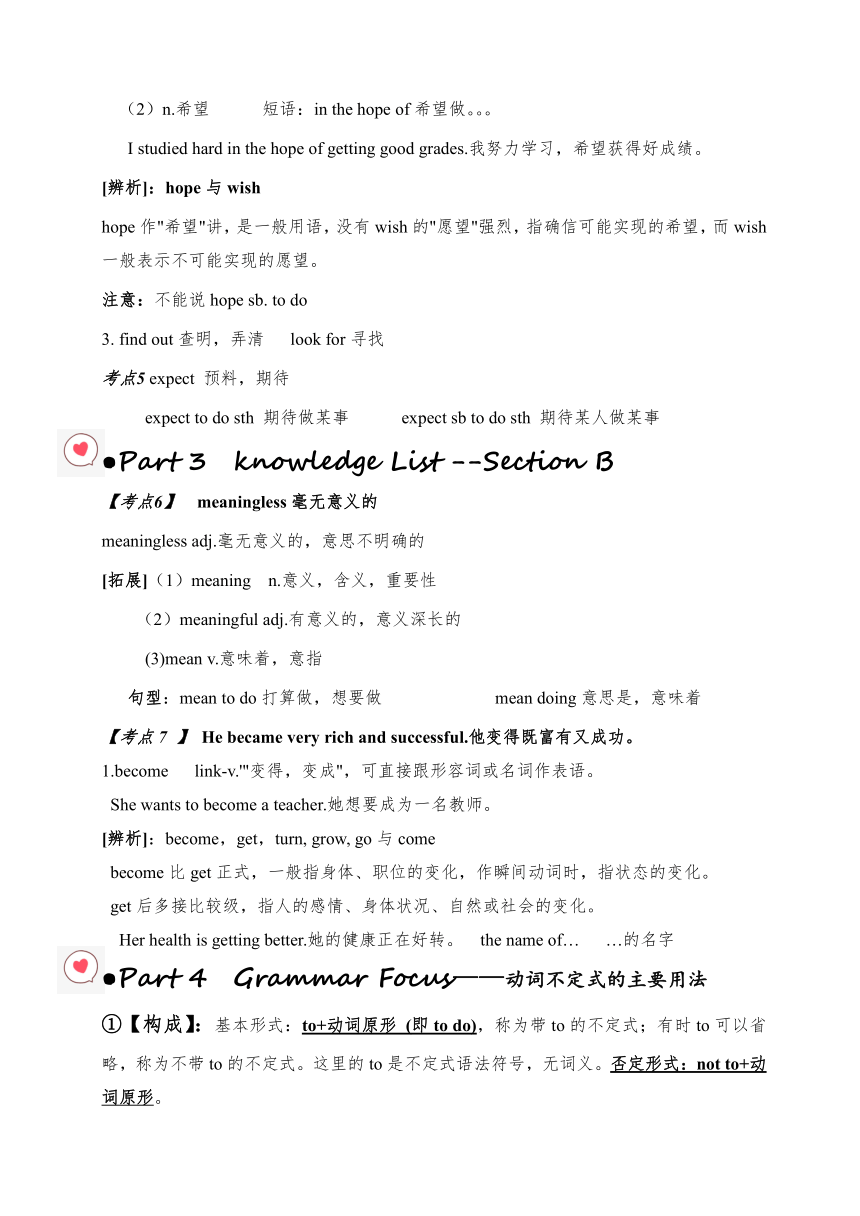Unit 5 What were you doing when the rainstorm came?单元知识点归纳总结
文档属性
| 名称 | Unit 5 What were you doing when the rainstorm came?单元知识点归纳总结 |

|
|
| 格式 | docx | ||
| 文件大小 | 347.6KB | ||
| 资源类型 | 教案 | ||
| 版本资源 | 人教新目标(Go for it)版 | ||
| 科目 | 英语 | ||
| 更新时间 | 2024-03-30 08:30:05 | ||
图片预览




文档简介
Unit 5 Do you want to watch a game show
●Part 2 knowledge List --Section A
【考点1】 don't mind不介意,不在乎
mind (1)v.介意,在乎。后面常跟名词、代词、动名词或从句(if\whether引导),常用在否定句、疑问句和条件句中。
Eg:Would you mind opening the door 你介意打开门吗?
Let me help you,if you don't mind.如果你不介意,让我来帮你吧。
Do you mind if I smoke here 你介意我在这儿抽烟吗?
(2)n.想法,意见,精神,心
body and mind身心 He always reads others' mind.他总能看透别人的心思。
[拓展]:与mind/有关的短语
make up one's mind to do 下定决心做某事 change one's mind改变主意 Keep...in mind 记住·····
Keep one's mind on专心于,专注于 never mind没关系,不要记在心上
选择填空
1. ---Father is sleeping. Would you mind the TV, Tom
---Not at all. I'll do it right away.
A. turning down B. to turn on C. turning up D. turn off
2. ---Do you mind if I sit here
--- .It's for Miss Liu.
A. Not at all B. Never mind C. Of course not D. Better not
【考点2】 can't stand无法忍受
stand(1)vt.容忍,忍受(=bear),尤其用于否定句或疑问句中,强调不喜欢,常与can\could等情态动词连用。
句型: can't stand sth.不能忍受某物
can't stand doing sth.不能忍受做某事
can't stand sb. doing sth.不能忍受某人做某事
(2)vt.\vi.(使)站立,竖起
There stands a big tree on the top of the mountain.山顶上有一颗大树。
[拓展]:与stand相关的短语
stand by站在一旁,袖手旁观 stand for代表,象征
stand out显眼,杰出,突出 stand up起立 stand in line排队 stand up for支持,拥护
选择填空
1.The girl can't stand her little brother talking.
A. keep B. keeping C. to keep D. kept
2.When the teacher came in, we should .
A. put up B. get up C. stand up D. look up
【考点3 】I like to follow the story and see what happens next.
我喜欢跟随故事看接下来发生什么。
follow vt.跟随(=go after)following adj接着的,其次的
Spring follows winter.冬去春来。
句型: follow sb. to do sth.跟着某人做某事
His mother followed him to see where he was going.他妈妈跟着他,看他要去哪儿。
[拓展]:follow的其他用法
(1)follow vt.遵循,仿效
短语:follow one's advice听从某人的劝告 follow one's example学某人的榜样
You should follow your teacher's advice and work hard.你应该听老师的劝告,努力学习。
(2)follow vt. 听懂,听清
I'm afraid I can't follow you, sir. Could you please speak more slowly 先生,我没听清,您能说更慢点吗?
happen vi."发生",与take place同义。
I don't know how this happened.我不知道这事是怎么发生的。
句型:sth. happen+地点|时间状语 某时\某地发生了某事
sth. happen to sb.某人发生了什么事
sth. happen to do sth.某人碰巧做某事
A car accident happened to her this morning.今天上午她出了车祸。
He happened to meet a friend of his on the street yesterday afternoon.
昨天下午他碰巧在街上遇到了他的一个朋友。
[辨析]:happen与take place
happen指偶然的、计划外的事情发生。
take place指计划中的事情发生。
What happened when you told him the news 你告诉他这个消息时,他有何反应?
Great changes have taken place in my hometown.我的家乡发生了巨大的变化。
练习检测---单项选择(15分)
( )1.I happened___________ a friend of mine on my way to Nanjing.
A. meet B. to meet C. met D. meeting
( )2.She is so sad.What has happened her.
A. in B. with C. at D. to
( )3.A bad traffic accident __________ yesterday.
A. happen B. take place C. happened D. took place
( )4.The May Fourth Movement in 1919.
A. happen B. take place C. happened D. took place
【考点4 】Why do you like watching the news 你为什么喜欢看新闻?
Because I hope to find out what's going on around the world. 因为我希望弄清楚全世界各地正在发生的事情。
news n.不可数名词,新闻,新闻节目
No news is good news.没有消息就是好消息。
注意:与news有关的量词用piece等。
a piece of news 一则消息 two pieces of news 两则消息
[拓展]:newspaper报纸(可数名词)
a daily newspaper 一份日报 a morning\ an evening newspaper 一份早晚报
hope(1)v.希望 后接动词不定式或从句作宾语
We hope to go to the moon one day.我们希望有一天能上月球。
(2)n.希望 短语:in the hope of希望做。。。
I studied hard in the hope of getting good grades.我努力学习,希望获得好成绩。
[辨析]:hope与wish
hope作"希望"讲,是一般用语,没有wish的"愿望"强烈,指确信可能实现的希望,而wish一般表示不可能实现的愿望。
注意:不能说hope sb. to do
3. find out查明,弄清 look for寻找
考点5 expect 预料,期待
expect to do sth 期待做某事 expect sb to do sth 期待某人做某事
●Part 3 knowledge List --Section B
【考点6】 meaningless毫无意义的
meaningless adj.毫无意义的,意思不明确的
[拓展](1)meaning n.意义,含义,重要性
(2)meaningful adj.有意义的,意义深长的
(3)mean v.意味着,意指
句型:mean to do打算做,想要做 mean doing意思是,意味着
【考点7 】 He became very rich and successful.他变得既富有又成功。
become link-v.'"变得,变成",可直接跟形容词或名词作表语。
She wants to become a teacher.她想要成为一名教师。
[辨析]:become,get,turn, grow, go与come
become比get正式,一般指身体、职位的变化,作瞬间动词时,指状态的变化。
get后多接比较级,指人的感情、身体状况、自然或社会的变化。
Her health is getting better.她的健康正在好转。 the name of… …的名字
●Part 4 Grammar Focus——动词不定式的主要用法
①【构成】:基本形式:to+动词原形 (即to do),称为带to的不定式;有时to可以省略,称为不带to的不定式。这里的to是不定式语法符号,无词义。否定形式:not to+动词原形。
eg: He wanted to sit down. (带to的不定式)
Let him sit down. (不带to的不定式)
②【语法功能】:不定式具有名词、形容词或副词的某些语法功能,又有动词的时态和语态的特点及作用。 因此,动词不定式可以做主语、宾语、宾语补足语、表语、定语、状语。
(
★
动词不定式作主语
)③【用法】:
动词不定式作主语时,可以直接放在谓语动词前面的主语位置,也可以用先行词it作形式主语,而将真正的主语(不定式)置于后面。常见的句式有:
(
(1) It is +
a
dj. (of sb.) to do sth.
(2) It is +
n
. (for sb.) to do sth
(3) It takes
sb. some time to do sth.
(4) It is +
a
dj. (for sb.) to do sth.
)
(1)把不定式置于句首。
To get there by bike will take us half an hour.
骑自行车到那儿要花费我们半个小时。
(2)用it作形式主语,把真正的主语不定式置于句后。
How long does it take you to finish your homework every day
你每天做家庭作业要多长时间?
It is difficult for us to finish so much work in such a short time.
对于我们来说,在这么短的时间内完成这么多的工作很困难。
【实战演练】
( )1. It's our duty _________ the room every day.
A.to clean B. cleaned C. clean D. cleans (甘肃省)
( )2. It's hard for us _________ English well.
A. learn B. learns C. to clean D. learning (江西省)
3.建造这座立交桥将花费工人们一年多的时间。
It will _____ the workers over a year ___ ________ the flyover.(北京市海淀区)
( )4. It's very nice _________ you to get me two tickets _________ the World Cup.
A. for,of B. of ; for C. to,for D. of,to (安徽省)
(
★
动词不定式作宾语
)
● (1)及物动词后直接跟带to的不定式。这类动词有:decide,know,want,forget,learn,
remember, offer,fail,hope,wish,choose,try等。
例:Remember to turn off the lights when you leave the classroom.
He failed to pass the English exam again. 他英语考试又考砸了。
Monitor decided to help me with my English. 班长决定帮我学英语了。
● (2)及物动词+疑问词+带to的不定式。
例:Please show us how to surf on the Internet. 请演示给我们如何网上冲浪。
There are so many kinds of radios on sale that I can’t make up my mind which to buy.
有这么多的收音机,我都拿不定主意买哪一种。
友情提醒:
⑴当复合宾语中的宾语是不定式时,先用形式宾语it代替不定式,把不定式置于补语之后,即:主语+动词+it+补语+to do句式。
例:We think it quite important for us to learn a foreign language well.
我们认为学好一门外语相当重要。
I find it very difficult to make friends with him. 我发觉和他交朋友很难。
⑵ 有一些表示感官的动词(如see, hear, watch, feel, notice等)和某些使役动词(如let, make, have等),其后跟不定式作宾语补足语时,不定式通常不带to。
例:I often hear her sing songs next door. 我经常听到她在隔壁唱歌。
What makes you feel so sad 什么使得你这么伤心?
【实战演练】
( )1. We saw him ______ the building and go upstairs.
A. to enter B. enter C. entering D. entered (河南省)
( )2. So much work usually makes them ______ very tired.
A. to feel B. feels C. feeling D. feel (吉林省)
( )3. Your father is sleeping. You'd better ______.
A. not wake up him B. not to wake up him
C. not wake him up D. not to wake him up (陕西省)
( )4. I was made ______ my homework in the afternoon.
A. do B. doing C. to do D. did (贵州省)
※拓展:感官动词后面还可用现在分词作宾语。区别为:不定式表示动作发生了,侧重全过程;现在分词则表示动作正在进行。
例:I can hear birds singing in the tree. 我能听见鸟在树上唱歌。
I often hear birds sing in the tree. 我经常听见鸟在树上唱歌。
(3) 动词help之后,带to或不带to都可以。
例:She often helps her mom clean the house at the weekend. 在周末她经常帮妈妈打扫房子。
【实战演练】
( )1. He wants ______ some vegetables.
A. buy B. buying C. to buy D. buys (山西省)
( )2. Don't forget ______ your homework with you when you come to school.
to bring B. bringing C. to take D. taking (福建省)
( )3. He found it very difficult ______.
A. sleeping B. sleeps C. slept D. to fall asleep (湖南省)
(
★
动词不定式
作状语
)
\
(1)作目的状语
例: He ran so fast as to catch the first bus. 他飞快地跑以便赶上第一班车。
(2)作结果状语,表事先没有预料到的,要放在句子后面。
例: He woke up to find everybody gone. 他醒来发现大家都走了。
※知识补充:一些常见的动词后面接不定式和接动词的-ing形式的区别如下:
stop to do sth. 停止正在做的事情去做另外一件事 stop doing sth 停止正在做的事
remember to do sth. 记住去做某事 (事还未做) remember doing sth 记得做过某事" (事已做)
go on to do sth. 接着做某事 (做完一事,接着做另一事) go on doing sth 继续做某事" (一事未做完接着往下做)
forget to do sth. 忘了做某事" (事还未做) forget doing sth 忘了曾做过某事" (事已做)。
动词不定式实战演练
一、用括号中所给动词的适当形式填空。
1. The purpose of the scheme is not to help the employers, but_______ (provide) work for young people. to provide
2. He arrived at the office early, _______ (set) a good example to the others. to set
3. It is right _______ (do) so at school. to do
4. Jack wants_______ (take) the underground to the Great Wall. to take
5. A garden is a good place _______ (meet) friends. to meet
6. Ask them_______ (not copy) others’ homework. not to copy
二、根据汉语意思完成句子。
1. 帮我打扫教室你真好。
It is very kind of you . to help me (to) clean the classroom
2. 我们所有人都发觉算出这道数学题很难。
All of us found it very difficult .
to work out (solve) the maths problem
3.我们应该尽力多吃蔬菜。
We should try . to eat more vegetables
4.什么时候走还没定下来呢。
hasn’t been decided yet. When to go
5. 他每天早上总是第一个到校。
He is always the first every morning.
to get to(arrive at/in reach) school
●Part 2 knowledge List --Section A
【考点1】 don't mind不介意,不在乎
mind (1)v.介意,在乎。后面常跟名词、代词、动名词或从句(if\whether引导),常用在否定句、疑问句和条件句中。
Eg:Would you mind opening the door 你介意打开门吗?
Let me help you,if you don't mind.如果你不介意,让我来帮你吧。
Do you mind if I smoke here 你介意我在这儿抽烟吗?
(2)n.想法,意见,精神,心
body and mind身心 He always reads others' mind.他总能看透别人的心思。
[拓展]:与mind/有关的短语
make up one's mind to do 下定决心做某事 change one's mind改变主意 Keep...in mind 记住·····
Keep one's mind on专心于,专注于 never mind没关系,不要记在心上
选择填空
1. ---Father is sleeping. Would you mind the TV, Tom
---Not at all. I'll do it right away.
A. turning down B. to turn on C. turning up D. turn off
2. ---Do you mind if I sit here
--- .It's for Miss Liu.
A. Not at all B. Never mind C. Of course not D. Better not
【考点2】 can't stand无法忍受
stand(1)vt.容忍,忍受(=bear),尤其用于否定句或疑问句中,强调不喜欢,常与can\could等情态动词连用。
句型: can't stand sth.不能忍受某物
can't stand doing sth.不能忍受做某事
can't stand sb. doing sth.不能忍受某人做某事
(2)vt.\vi.(使)站立,竖起
There stands a big tree on the top of the mountain.山顶上有一颗大树。
[拓展]:与stand相关的短语
stand by站在一旁,袖手旁观 stand for代表,象征
stand out显眼,杰出,突出 stand up起立 stand in line排队 stand up for支持,拥护
选择填空
1.The girl can't stand her little brother talking.
A. keep B. keeping C. to keep D. kept
2.When the teacher came in, we should .
A. put up B. get up C. stand up D. look up
【考点3 】I like to follow the story and see what happens next.
我喜欢跟随故事看接下来发生什么。
follow vt.跟随(=go after)following adj接着的,其次的
Spring follows winter.冬去春来。
句型: follow sb. to do sth.跟着某人做某事
His mother followed him to see where he was going.他妈妈跟着他,看他要去哪儿。
[拓展]:follow的其他用法
(1)follow vt.遵循,仿效
短语:follow one's advice听从某人的劝告 follow one's example学某人的榜样
You should follow your teacher's advice and work hard.你应该听老师的劝告,努力学习。
(2)follow vt. 听懂,听清
I'm afraid I can't follow you, sir. Could you please speak more slowly 先生,我没听清,您能说更慢点吗?
happen vi."发生",与take place同义。
I don't know how this happened.我不知道这事是怎么发生的。
句型:sth. happen+地点|时间状语 某时\某地发生了某事
sth. happen to sb.某人发生了什么事
sth. happen to do sth.某人碰巧做某事
A car accident happened to her this morning.今天上午她出了车祸。
He happened to meet a friend of his on the street yesterday afternoon.
昨天下午他碰巧在街上遇到了他的一个朋友。
[辨析]:happen与take place
happen指偶然的、计划外的事情发生。
take place指计划中的事情发生。
What happened when you told him the news 你告诉他这个消息时,他有何反应?
Great changes have taken place in my hometown.我的家乡发生了巨大的变化。
练习检测---单项选择(15分)
( )1.I happened___________ a friend of mine on my way to Nanjing.
A. meet B. to meet C. met D. meeting
( )2.She is so sad.What has happened her.
A. in B. with C. at D. to
( )3.A bad traffic accident __________ yesterday.
A. happen B. take place C. happened D. took place
( )4.The May Fourth Movement in 1919.
A. happen B. take place C. happened D. took place
【考点4 】Why do you like watching the news 你为什么喜欢看新闻?
Because I hope to find out what's going on around the world. 因为我希望弄清楚全世界各地正在发生的事情。
news n.不可数名词,新闻,新闻节目
No news is good news.没有消息就是好消息。
注意:与news有关的量词用piece等。
a piece of news 一则消息 two pieces of news 两则消息
[拓展]:newspaper报纸(可数名词)
a daily newspaper 一份日报 a morning\ an evening newspaper 一份早晚报
hope(1)v.希望 后接动词不定式或从句作宾语
We hope to go to the moon one day.我们希望有一天能上月球。
(2)n.希望 短语:in the hope of希望做。。。
I studied hard in the hope of getting good grades.我努力学习,希望获得好成绩。
[辨析]:hope与wish
hope作"希望"讲,是一般用语,没有wish的"愿望"强烈,指确信可能实现的希望,而wish一般表示不可能实现的愿望。
注意:不能说hope sb. to do
3. find out查明,弄清 look for寻找
考点5 expect 预料,期待
expect to do sth 期待做某事 expect sb to do sth 期待某人做某事
●Part 3 knowledge List --Section B
【考点6】 meaningless毫无意义的
meaningless adj.毫无意义的,意思不明确的
[拓展](1)meaning n.意义,含义,重要性
(2)meaningful adj.有意义的,意义深长的
(3)mean v.意味着,意指
句型:mean to do打算做,想要做 mean doing意思是,意味着
【考点7 】 He became very rich and successful.他变得既富有又成功。
become link-v.'"变得,变成",可直接跟形容词或名词作表语。
She wants to become a teacher.她想要成为一名教师。
[辨析]:become,get,turn, grow, go与come
become比get正式,一般指身体、职位的变化,作瞬间动词时,指状态的变化。
get后多接比较级,指人的感情、身体状况、自然或社会的变化。
Her health is getting better.她的健康正在好转。 the name of… …的名字
●Part 4 Grammar Focus——动词不定式的主要用法
①【构成】:基本形式:to+动词原形 (即to do),称为带to的不定式;有时to可以省略,称为不带to的不定式。这里的to是不定式语法符号,无词义。否定形式:not to+动词原形。
eg: He wanted to sit down. (带to的不定式)
Let him sit down. (不带to的不定式)
②【语法功能】:不定式具有名词、形容词或副词的某些语法功能,又有动词的时态和语态的特点及作用。 因此,动词不定式可以做主语、宾语、宾语补足语、表语、定语、状语。
(
★
动词不定式作主语
)③【用法】:
动词不定式作主语时,可以直接放在谓语动词前面的主语位置,也可以用先行词it作形式主语,而将真正的主语(不定式)置于后面。常见的句式有:
(
(1) It is +
a
dj. (of sb.) to do sth.
(2) It is +
n
. (for sb.) to do sth
(3) It takes
sb. some time to do sth.
(4) It is +
a
dj. (for sb.) to do sth.
)
(1)把不定式置于句首。
To get there by bike will take us half an hour.
骑自行车到那儿要花费我们半个小时。
(2)用it作形式主语,把真正的主语不定式置于句后。
How long does it take you to finish your homework every day
你每天做家庭作业要多长时间?
It is difficult for us to finish so much work in such a short time.
对于我们来说,在这么短的时间内完成这么多的工作很困难。
【实战演练】
( )1. It's our duty _________ the room every day.
A.to clean B. cleaned C. clean D. cleans (甘肃省)
( )2. It's hard for us _________ English well.
A. learn B. learns C. to clean D. learning (江西省)
3.建造这座立交桥将花费工人们一年多的时间。
It will _____ the workers over a year ___ ________ the flyover.(北京市海淀区)
( )4. It's very nice _________ you to get me two tickets _________ the World Cup.
A. for,of B. of ; for C. to,for D. of,to (安徽省)
(
★
动词不定式作宾语
)
● (1)及物动词后直接跟带to的不定式。这类动词有:decide,know,want,forget,learn,
remember, offer,fail,hope,wish,choose,try等。
例:Remember to turn off the lights when you leave the classroom.
He failed to pass the English exam again. 他英语考试又考砸了。
Monitor decided to help me with my English. 班长决定帮我学英语了。
● (2)及物动词+疑问词+带to的不定式。
例:Please show us how to surf on the Internet. 请演示给我们如何网上冲浪。
There are so many kinds of radios on sale that I can’t make up my mind which to buy.
有这么多的收音机,我都拿不定主意买哪一种。
友情提醒:
⑴当复合宾语中的宾语是不定式时,先用形式宾语it代替不定式,把不定式置于补语之后,即:主语+动词+it+补语+to do句式。
例:We think it quite important for us to learn a foreign language well.
我们认为学好一门外语相当重要。
I find it very difficult to make friends with him. 我发觉和他交朋友很难。
⑵ 有一些表示感官的动词(如see, hear, watch, feel, notice等)和某些使役动词(如let, make, have等),其后跟不定式作宾语补足语时,不定式通常不带to。
例:I often hear her sing songs next door. 我经常听到她在隔壁唱歌。
What makes you feel so sad 什么使得你这么伤心?
【实战演练】
( )1. We saw him ______ the building and go upstairs.
A. to enter B. enter C. entering D. entered (河南省)
( )2. So much work usually makes them ______ very tired.
A. to feel B. feels C. feeling D. feel (吉林省)
( )3. Your father is sleeping. You'd better ______.
A. not wake up him B. not to wake up him
C. not wake him up D. not to wake him up (陕西省)
( )4. I was made ______ my homework in the afternoon.
A. do B. doing C. to do D. did (贵州省)
※拓展:感官动词后面还可用现在分词作宾语。区别为:不定式表示动作发生了,侧重全过程;现在分词则表示动作正在进行。
例:I can hear birds singing in the tree. 我能听见鸟在树上唱歌。
I often hear birds sing in the tree. 我经常听见鸟在树上唱歌。
(3) 动词help之后,带to或不带to都可以。
例:She often helps her mom clean the house at the weekend. 在周末她经常帮妈妈打扫房子。
【实战演练】
( )1. He wants ______ some vegetables.
A. buy B. buying C. to buy D. buys (山西省)
( )2. Don't forget ______ your homework with you when you come to school.
to bring B. bringing C. to take D. taking (福建省)
( )3. He found it very difficult ______.
A. sleeping B. sleeps C. slept D. to fall asleep (湖南省)
(
★
动词不定式
作状语
)
\
(1)作目的状语
例: He ran so fast as to catch the first bus. 他飞快地跑以便赶上第一班车。
(2)作结果状语,表事先没有预料到的,要放在句子后面。
例: He woke up to find everybody gone. 他醒来发现大家都走了。
※知识补充:一些常见的动词后面接不定式和接动词的-ing形式的区别如下:
stop to do sth. 停止正在做的事情去做另外一件事 stop doing sth 停止正在做的事
remember to do sth. 记住去做某事 (事还未做) remember doing sth 记得做过某事" (事已做)
go on to do sth. 接着做某事 (做完一事,接着做另一事) go on doing sth 继续做某事" (一事未做完接着往下做)
forget to do sth. 忘了做某事" (事还未做) forget doing sth 忘了曾做过某事" (事已做)。
动词不定式实战演练
一、用括号中所给动词的适当形式填空。
1. The purpose of the scheme is not to help the employers, but_______ (provide) work for young people. to provide
2. He arrived at the office early, _______ (set) a good example to the others. to set
3. It is right _______ (do) so at school. to do
4. Jack wants_______ (take) the underground to the Great Wall. to take
5. A garden is a good place _______ (meet) friends. to meet
6. Ask them_______ (not copy) others’ homework. not to copy
二、根据汉语意思完成句子。
1. 帮我打扫教室你真好。
It is very kind of you . to help me (to) clean the classroom
2. 我们所有人都发觉算出这道数学题很难。
All of us found it very difficult .
to work out (solve) the maths problem
3.我们应该尽力多吃蔬菜。
We should try . to eat more vegetables
4.什么时候走还没定下来呢。
hasn’t been decided yet. When to go
5. 他每天早上总是第一个到校。
He is always the first every morning.
to get to(arrive at/in reach) school
同课章节目录
- Unit 1 What's the matter?
- Section A
- Section B
- Unit 2 I'll help to clean up the city parks.
- Section A
- Section B
- Unit 3 Could you please clean your room?
- Section A
- Section B
- Unit 4 Why don't you talk to your parents?
- Section A
- Section B
- Unit 5 What were you doing when the rainstorm came
- Section A
- Section B
- Review of Units 1-5
- Unit 6 An old man tried to move the mountains.
- Section A
- Section B
- Unit 7 What's the highest mountain in the world?
- Section A
- Section B
- Unit 8 Have you read Treasure Island yet?
- Section A
- Section B
- Unit 9 Have you ever been to a museum?
- Section A
- Section B
- Unit 10 I've had this bike for three years.
- Section A
- Section B
